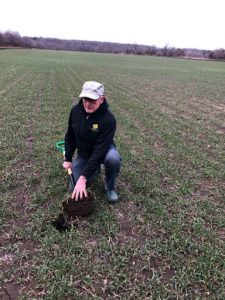
National Soil Conservation Week: A Time for Reflection on the Role of Healthy Soil for Healthy Food
Guelph, Ontario – Each year in April, National Soil Conservation Week is celebrated to bring special attention to the role of farmland soil for providing abundant food for consumers. Not to be taken for granted, this year April 21-27 is a reminder that the thin layer of topsoil covering farmers’ fields requires extensive knowledge and superior management skill to ensure our food capacity remains eminent for future generations.
“Ancient civilizations, such as the Mesopotamians, Greeks, and Romans faced serious soil erosion which plugged irrigation canals causing food shortages and social unrest, ultimately leading to decline of those societies,” says Les Nichols, President of the Ontario Soil and Crop Improvement Association (OSCIA). “We are fortunate today that we have superior knowledge through innovation and practical farmer experiences that protects and improves the health of soil. We are thankful for continued investment in research and technical advancement to protect our future as food producers.”
The OSCIA, formed in 1939, is a farmer-led network encompassing all 50 counties/districts/regions of Ontario with a special focus to “Facilitate responsible economic management of soil, water, air and crops through development and communication of innovative farming practices.” (https://www.ontariosoilcrop.org/association/association-about/)
Recently, OSCIA released a book entitled The Soil Fixers which chronicles achievements in soil and water conservation since the 1980s. Authored by OSCIA senior manager Harold Rudy, who was close to the action of OSCIA and its members through many programs in support of farmers’ innovation, The Soil Fixers outlines advancements in superior soil restoration and conservation over that time-frame. Many farmers now incorporate no-till planters, which inject new crop seeds among last year’s leaves and stems which protect the soil over the winter months. Crop rotation from one year to the next also breaks up weed, insect and disease cycles to minimize the use of pesticides. Farmers have also recognized the importance of alfalfa and pasture lands for soil protection but not all farmers have that option so the recent movement to plant over-wintering cover crops for improved soil microbial life and carbon sequestration improves soil health.
The Soil Fixers Table of Contents covers a multitude of topics where OSCIA administered over $200 million of federal and provincial program funding supported by Agriculture and Agri-Food Canada and the Ontario Ministry of Agriculture, Food and Rural Affairs. Additionally, OSCIA tracked an additional $400 million invested by the farm community themselves in support of conservation efforts.
“It was challenging to keep The Soil Fixers at about 300 pages but we tried to capture the most prominent highlights of OSCIA through over 30 years,” says Harold Rudy in reflecting on the task of assembling the stories.
Proceeds on sales from The Soil Fixers go to OSCIA for student scholarships or on-farm research.
Source : OSCIA